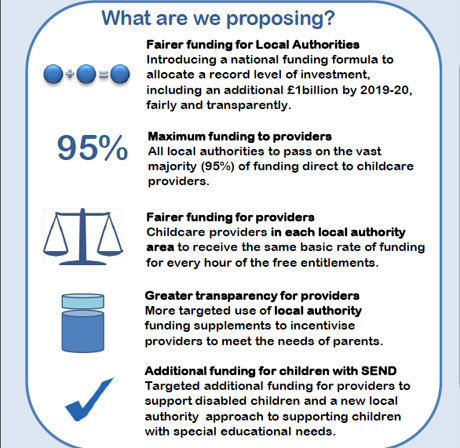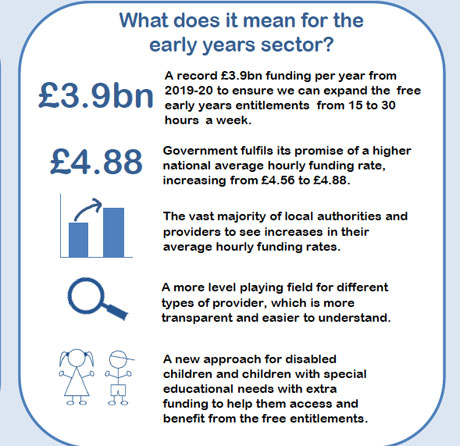
The Department for Education acknowledges that the current system is not working and says that the majority of 30-hour places will be provided by the private and voluntary sector, which needs to be incentivised to offer them.
The consultation proposals therefore aim to address the historic disparities in levels of local authority funding that have led to some settings receiving as little as £3.24 and others £9.17 an hour per child.
Childcare providers in each local authority area will receive the same basic rate of funding for every hour of the free entitlements.
The new early years national funding formula that will replace the current system will be made up of three funding factors:
- a universal base rate of funding for each child
- an additional needs factor
- an area cost adjustment reflecting the different costs of providing childcare in different areas of the country
The new system will be brought in from April 2017 for the 15-hour entitlement for three- and four-year-olds, and from September 2017 when the 30-hour offer for working parents is rolled out across the country.
Average hourly rates will be £4.88 for three- and four-year-olds (including the Early Years Pupil Premium) and £5.39 for two-year-olds.
The DfE also intends to ensure that funding reaches the frontline by bringing in ‘a high minimum threshold’ on the amount of funding that local authorities must pass on to providers: 93 per cent in 2017-18 and 95 percent thereafter.
The Government is asking for views from local authorities and providers on whether this should be in statutory legislation.
Analysis by the DfE says that 132 local authorities will gain funding and in only 18 will they face cuts.
Local authorities will be required to use a universal base rate from 2019-20 at the latest, so that a child in a private or voluntary nursery will receive the same level of ‘per child’ funding as a child in a nursery class in school or in a nursery school. This is because the Government wants to end differences in funding between different parts of the market.
To make the system simpler for providers, local authorities will be limited in the types of supplements they can offer. These will be limited to deprivation, rural areas, flexibility and key policy objectives, such as a supplement to settings offering the 30 hours. The DfE is also consulting on whether there should be cap of 10 per cent on the amount of funding that can come from these supplements.
The consultation says that it anticipates a 16 per cent indicative average increase to private and voluntary providers, and a 14 per cent indicative average increase to schools.
There will also be supplementary funding for maintained nursery schools for at least two years to keep their transition to a universal base rate manageable.
The Government will provide supplementary funding of £55 million a year to local authorities for maintained nursery schools for at least two years.
The DfE is also proposing to introduce a new £12.5 million Disability Access Fund to support disabled children to access the free entitlements. Local inclusion funds for children with special educational needs will support providers in this area.
Alongside the consultation, the DfE is publishing tables showing how its proposals would affect each local authority, what would happen under the proposed early years national funding formula if child numbers and characteristics stayed exactly as they were in 2016-17. The tables show the expected impact in 2017-18, as well as the effect when the formula is implemented in full – that is, without transitional protections.
Launching the six-week consultation education secretary Justine Greening said, ‘We are committed to making sure this is a country that works for everyone, not just the privileged few. Education lies at the heart of this ambition and the early years are crucial to giving every child the best start in life.
‘We are working with nurseries, preschools and childminders to support working parents with the costs of raising a family doubling our free childcare offer to 30 hours for working parents of three- and four-year-olds. But to deliver on that commitment we know we must give every area of the country the funding it needs.
‘These changes will transform the way we fund early years’ education, creating a fairer system that better provides the affordable, high-quality childcare families deserve.’
Consultation: Early years funding - Changes o funding for 3 and 4 year olds


Source: DfE
- The consultation runs from 11 August – 22 September. The Government’s response to the consultation will be published in the Autumn.









